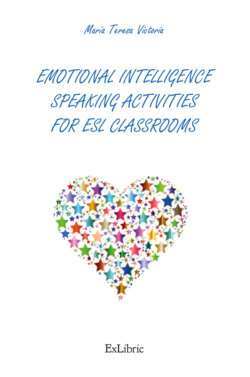Описание книги
Emotional Intelligence for ESL Classrooms is my contribution to English language teaching. Rather than aiming at writing this book, the activities shaped themselves one day into the form of this book after completing my doctoral studies in Emotional Intelligence and Mindfulness at the University of Málaga. Emotions live within us all and can emerge in classrooms of any kind, fi lled with pupils of a wide age range. These activities are therefore not aimed at a specifi c type or level group of students, but served as an array of possibilities from where my fellow teachers can pick & take into their classrooms to complement their lessons.
The intention behind emotional intelligence practices is to generate a positive, non-punitive climate in the English classroom which boosts the students' self-confidence. An emotionally intelligent classroom where game-based learning activities and challenges can well coexist with Mindfulness interventions, which may raise self awareness of the students' learning processes, and where they can actually feel that mistakes are good opportunities to learn. Far from being too embarrassed to speak English students in emotionally intelligent classrooms will become more participative and willing to interact with their classmates, not only in class but also during out-of-class extracurricular activities.
May the reader indulge in the illustrations from Pixabay, which have been selected for each activity as intentional prompts for conversation. Images can always provide extra opportunities for Mindfulness and Emotional Intelligence interventions in the classroom that can evoke connectivity and enhance concentration by focusing on the small details and relating to experiential practices. Visuals can actually be ever lasting ice-breakers for detailed imaginative creative exercises connected with the senses.
The intention behind emotional intelligence practices is to generate a positive, non-punitive climate in the English classroom which boosts the students' self-confidence. An emotionally intelligent classroom where game-based learning activities and challenges can well coexist with Mindfulness interventions, which may raise self awareness of the students' learning processes, and where they can actually feel that mistakes are good opportunities to learn. Far from being too embarrassed to speak English students in emotionally intelligent classrooms will become more participative and willing to interact with their classmates, not only in class but also during out-of-class extracurricular activities.
May the reader indulge in the illustrations from Pixabay, which have been selected for each activity as intentional prompts for conversation. Images can always provide extra opportunities for Mindfulness and Emotional Intelligence interventions in the classroom that can evoke connectivity and enhance concentration by focusing on the small details and relating to experiential practices. Visuals can actually be ever lasting ice-breakers for detailed imaginative creative exercises connected with the senses.
